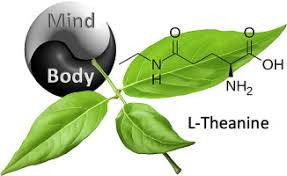L-theanine, i.e., N-ethyl-G-glutamine, is a unique non-protein amino acid in tea that was first discovered in green tea by Sakato in 1949.
L-theanine has been known to improve sleep quality (Wei et al. 2022), gastric ulcers (Chatterjee et al. 2014), cerebral ischemia/reperfusion injury (Sun et al. 2013), post-traumatic stress disorder (Ceremuga et al. 2014), etc., suggesting a variety of physiological functions such as anti-inflammatory (Podolsky 2002), anti-apoptotic (Li et al. 2018), antioxidant (Liu et al. 2022), and neuroprotective effects (Takehana et al. 2017)
It is known for Neurotransmitter Modulation:
GABA Enhancement: L-theanine may increase the levels of the inhibitory neurotransmitter GABA, which plays a crucial role in calming and reducing anxiety.
Dopamine and Serotonin Release: Studies suggest that L-theanine can enhance the release of dopamine and serotonin, neurotransmitters associated with mood and cognitive function.
Glutamate Receptor Antagonism: L-theanine is structurally similar to glutamate and may act as a glutamate receptor antagonist, potentially reducing excessive glutamate activity, which is linked to excitotoxicity and neuronal damage. L Theanine calms OCD by reducing OCD is driven by excessive glutamate, which is excitatory for the brain.
Studies suggest l-theanine may increase alpha waves in the brain associated with relaxation and selective attention, reduce stress and anxiety, and improve sleep quality and also lessens time to fall asleep. It activates flow state ,slows down racing thoughts ( likein Akathisia and anxiety) and increases verbal fluency . It may help boost and sharpen your mental focus if you are experiencing brain fog.
Research suggests that L-theanine may shield brain cells from excitotoxicity by calming nerve networks in the brain.
Salivary alpha-amylase (sAA) is considered a marker of stress. It's released by the parotid glands in response to the activation of the autonomic nervous system, and its levels increase during both physical and psychological stress. Therefore, sAA can be used as a non-invasive biomarker for assessing the sympathetic nervous system and its response to stress. L-theanine supplementation can lead to a reduction in both subjective stress and sAA levels.
By modulating NMDA receptors and inhibiting glutamine transporters, L-theanine may contribute to neuroprotective effects, potentially reducing excitotoxicity and neuronal damage.Studies suggest that L-theanine can increase both the gene and protein expression of BDNF. BDNF is a protein that plays a crucial role in brain health, supporting neuronal growth, survival, and plasticity. Other research indicates that L-theanine may help protect against brain damage and cognitive decline. Chronic Stress can lower brain volume causing brain Shrinkage. L theanine shields your brain from stress and even helps with memory and learning.L-Theanine's anti-stress, antioxidant effects can preserve the structure of the brain.
L-theanine can help you quit nicotine
It reduces the expression of nicotine acetylcholine receptors (nAChRs) in key brain reward areas.
(The ones that keep you addicted)
Studies, including one published in Neurosci Lett. 2023 Jun 11, suggest that L-theanine may help mitigate these withdrawal symptoms.
L theanine and Parkinson's disease :
L-theanine shields the dopaminergic neurons from degeneration and improves the number of tyrosine hydroxylase-positive cells. l-theanine exhibits the potential to alleviate both the motor impairments and non-motor symptoms linked with Parkinson's disease
L Theanine and Multiple Sclerosis :
One short trial with 12 participants discovered that ingesting 200 mg of L-theanine twice daily for eight weeks greatly enhanced MS patients’ levels of fatigue, mood, and quality of life. Twenty participants in another study discovered that consuming 200 mg of L-theanine twice daily for 12 weeks significantly reduced their levels of anxiety and depression.
L-theanine may help alleviate oxidative damage and inflammatory responses in the injured area, and even antagonize myelin-related inhibitory effects , promoting nerve regeneration and functional recovery.
Nerve Regeneration and Functional Recovery:
Studies, particularly in models of nerve injury like brachial plexus root avulsion, have demonstrated that L-theanine, especially when combined with other compounds like NEP1-40, can promote nerve regeneration and functional recovery.
L Theanine as Natures Anti Histamine
L-theanine is a mast cell stabilizer that can reduce anaphylactic shock. L-theanine can inhibit stress by blocking glutamate receptors. Excess histamine can lead to the buildup of glutamate . L-theanine works by both preventing histamine release, and also blocking glutamate activity as well.
According to a 2013 review published in the British Journal of Pharmacology, L-theanine may offer some anti-allergic activity . Researchers found that L-theanine may decrease histamine release from rat mesenchymal precursor cells (rMPCs) and human mast cell line-1 (HMC-1), may reduce the secretion of pro-inflammatory cytokines, and may help to stabilize your mast cells.
A 2011 study published in Amino Acids has found that theanine may help to stabilize mast cells and reduce mast cell histamine release . A 2016 study published in Food and Chemical Toxicology has found that L-theanine may help to reduce allergic response and inflammation of the airways in allergic asthma.



It helps my essential tremors. Not perfect but decent